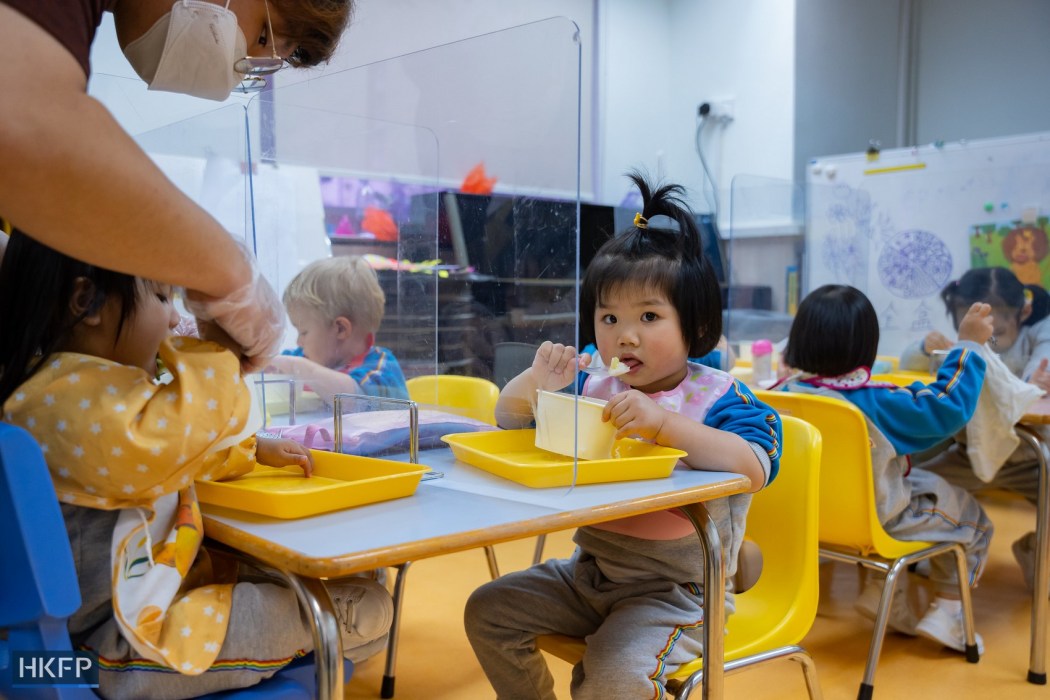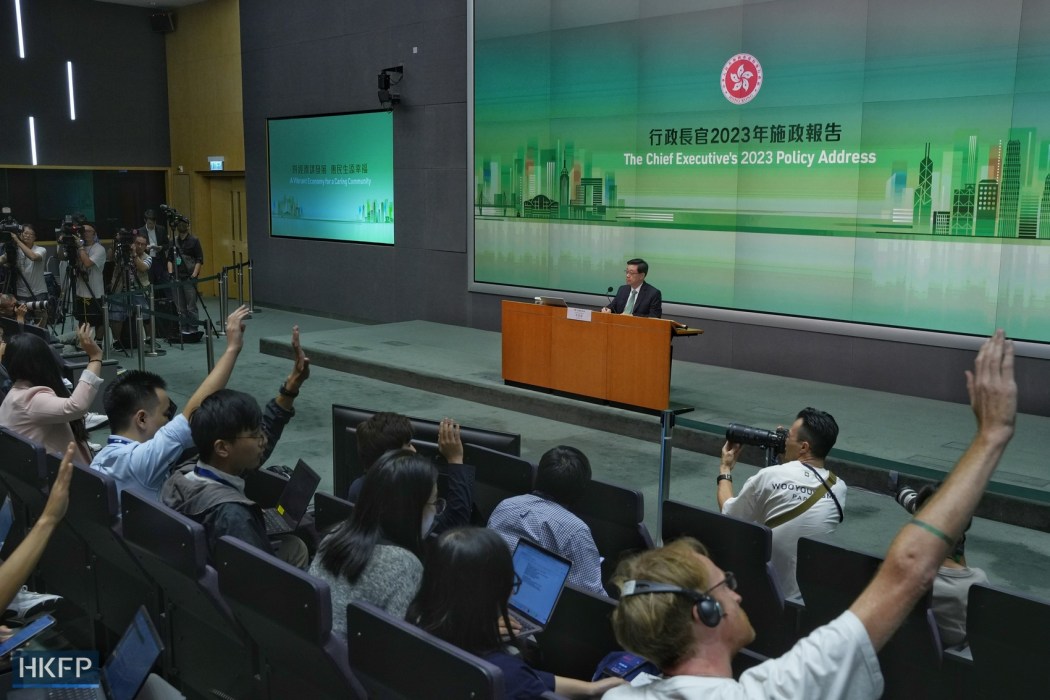Mrs Lau once dreamed of having three children. Both her parents have massive families – her mother has 11 siblings – and she believes that a big family is a happy one. The 31-year-old looks forward to every holiday gathering, when she can catch up with relatives and share the kind of inside jokes that only family can.

But now, as a mother of a two-month-old, Lau, who declined to give her first name, said she was having second thoughts. “I’ve done the math,” she told HKFP in Cantonese. “You need a lot of resources to take care of a child.”
The 31-year-old was speaking to HKFP by phone from home while on maternity leave, a day after Chief Executive John Lee announced in his annual Policy Address on Wednesday that the government would offer HK$20,000 to new parents. The move is an attempt to boost Hong Kong’s low birth rate and address the city’s ageing population.
The public relations manager, however, said HK$20,000 was a laughably low amount.
Before she gave birth, Lau said she spent around HK$10,000 on pre-natal checks at a private clinic alone. Buying a stroller, furniture, clothes and a breast pump easily added up to tens of thousands of dollars.
Like other first-time mothers, Lau also hired a “pui yuet” – a nanny trained in postpartum care – to help. The nanny came to Lau’s flat for around eight hours a day for a month to cook, shower and take care of the baby, and show her the ropes of motherhood. Hiring the nanny cost her HK$28,000, Lau told HKFP.

“HK$20,000 would have been better than nothing,” Lau said. “But would a couple have children because of it? Probably not.”
The handout was part of a series of measures intended to boost fertility. Separately, the city’s Housing Authority will begin prioritising families with children to help them purchase subsidised flats under home ownership schemes. Families with newborns who are in the queue for public housing will also have their wait times reduced by one year. At present, the average period spent waiting to be housed in government-subsidised accommodation is 5.3 years.
The government also plans to expand quotas at subsidised day care and afterschool centres to support working parents, Lee said.
‘Not actively thinking about it’
Like many developed societies, Hong Kong has seen a steadily declining birth rate in recent years. According to official statistics, the average number of children per woman was 0.9 in 2022, down from 1.3 in 2012.
By the end of the next decade, a third of the city’s population is expected to be aged 65 and above. Hong Kong’s labour force has downsized by 6 per cent between 2018 and 2022, a shrinkage that has “inevitably resulted in significant manpower shortage,” according to a Legislative Council document.

The half a dozen married Hongkongers that HKFP spoke to for this story, however, said there were a plethora of reasons why they were choosing not to have children – and money was not chief among them. They ranged from Hong Kong’s relatively short parental leave, a competitive schooling system, and a lack of childcare options.
Hong Kong is also not particularly friendly to pregnant people and babies, Lau said, recounting times that she was visibly pregnant and not offered a seat on the MTR or bus.
“Society is not very forgiving to parenthood,” Lau said.
Political events in recent years, she added, had also affected people’s desire to have children. She said she had friends who were considering leaving Hong Kong and putting off plans to potentially have children.
A survey by a global recruitment consultancy found last year that more than half of Hong Kong professionals considered emigrating in the near future, and the city experienced an exodus after the 2019 protests and the Covid-19 pandemic and national security law imposed by Beijing the following year.

Adam Cheung, an associate professor of sociology at the Hong Kong Baptist University, told HKFP by phone he thought the impact of the baby bonus would be limited.
“It’s not all about money,” Cheung said in Cantonese. “If some couples don’t want babies or just want to have one child, I don’t think [the baby bonus] would change their preference.”
To tackle Hong Kong’s low birth rate, the city would need measures that address issues such as gender inequality, and for the government to take the lead in encouraging more family-friendly policies in the workplace, he said.
Even so, some cultural factors cannot be addressed by policy, he said.
“There is a high standard of parenting. We all want our children to be outstanding at school, which demands parental involvement,” Cheung said. “For these competing workplace and parenting [priorities], people avoid having babies because they cannot fulfil the demands from both domains.”
Mr Lam, a surveyor who got married three years ago, said he and his wife were undecided if they wanted children – but were leaning towards a no. The 33-year-old, who spoke in Cantonese and also declined to give his first name, said he was busy with his side business running an art studio, while his wife loved travelling. They would have to invest a significant amount of their time if they were to have a child, he said.

“We’re in our early 30s. Maybe we might decide to have children further down the road, but for now, we’re not actively thinking about it,” Lam told HKFP by phone.
Middle- vs working-class families
Offering money to encourage childbirth is nothing new, with many countries facing declining fertility rates resorting to financial incentives.
Since 2001, Singapore has had a Baby Bonus Scheme that has been gradually expanded over the years. Now, the country offers parents a “cash gift” of SG$11,000 (HK$62,800) for each of the first two children, and SG$13,000 for every subsequent child. Parents can also set up Child Development Accounts, to which the government will contribute SG$5,000 that can be used for expenses such as healthcare and schooling.
Even with more mature and comprehensive policies to promote fertility, Cheung said the impact in Singapore had been limited because many of the reasons families in developed societies did not want children could not be solved by money.

In Hong Kong, Cheung estimated that the benefits of the newly-announced measures would be most keenly felt by working class families, for whom HK$20,000 was a more significant sum. They were also more likely to use the subsidised day care and afterschool centres that the government was expanding.
Sze Lai-shan, the deputy director of the Society for Community Organization (SoCO), told HKFP that the HK$20,000 baby bonus was “great news” for low-income families who were planning to have children.
But, for those with no intention to have more, or any, children, Sze doubted that the HK$20,000 handout would not be enough to move the needle.
She said that instead of a one-off cash incentive, the government should probe the systemic reasons why Hongkongers were not motivated to have children. Long working hours, a lack of childcare options, and substandard living spaces were all reasons that deterred couples from having more children, she said.
“Paying attention to these issues would go a much longer way than a one-off cash handout,” Sze said.
Support HKFP | Policies & Ethics | Error/typo? | Contact Us | Newsletter | Transparency & Annual Report | Apps
Help safeguard press freedom & keep HKFP free for all readers by supporting our team

The post ‘Not all about money’: Hong Kong’s low birth rate needs more than cash to convince couples to have kids appeared first on Hong Kong News Hub.
from
https://hongkongnewshk.com/not-all-about-money-hong-kongs-low-birth-rate-needs-more-than-cash-to-convince-couples-to-have-kids/




No comments:
Post a Comment